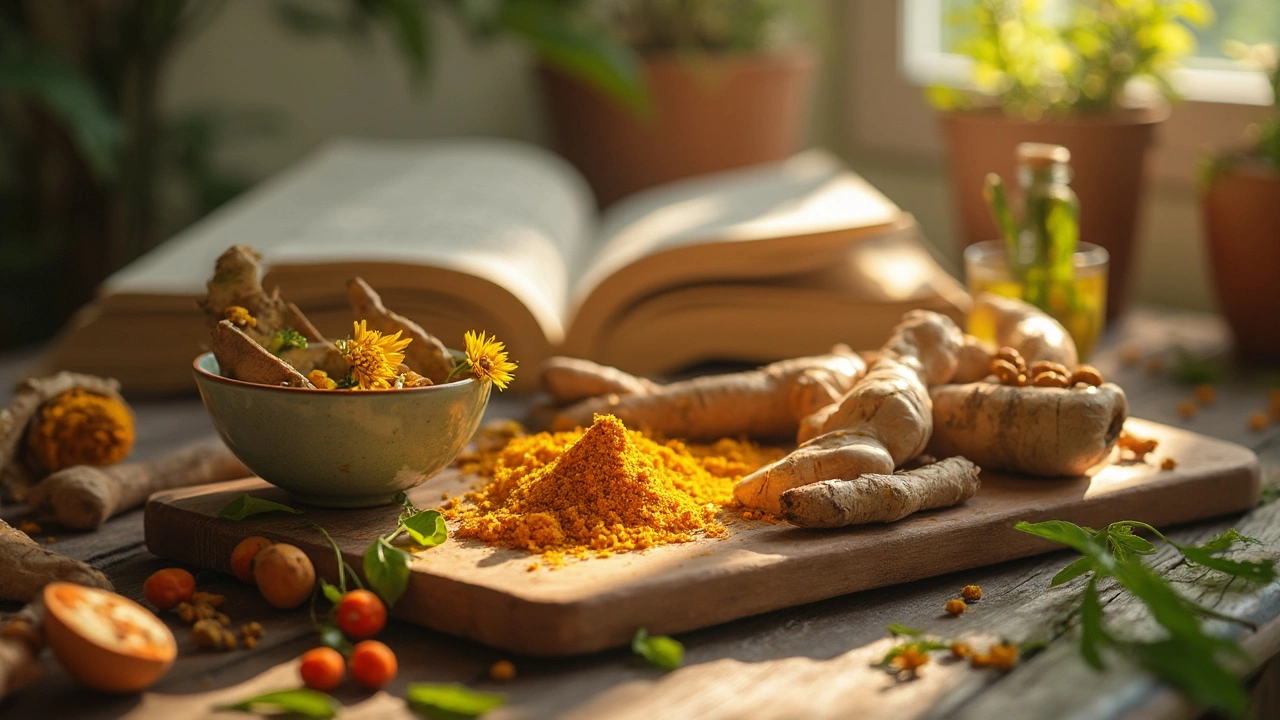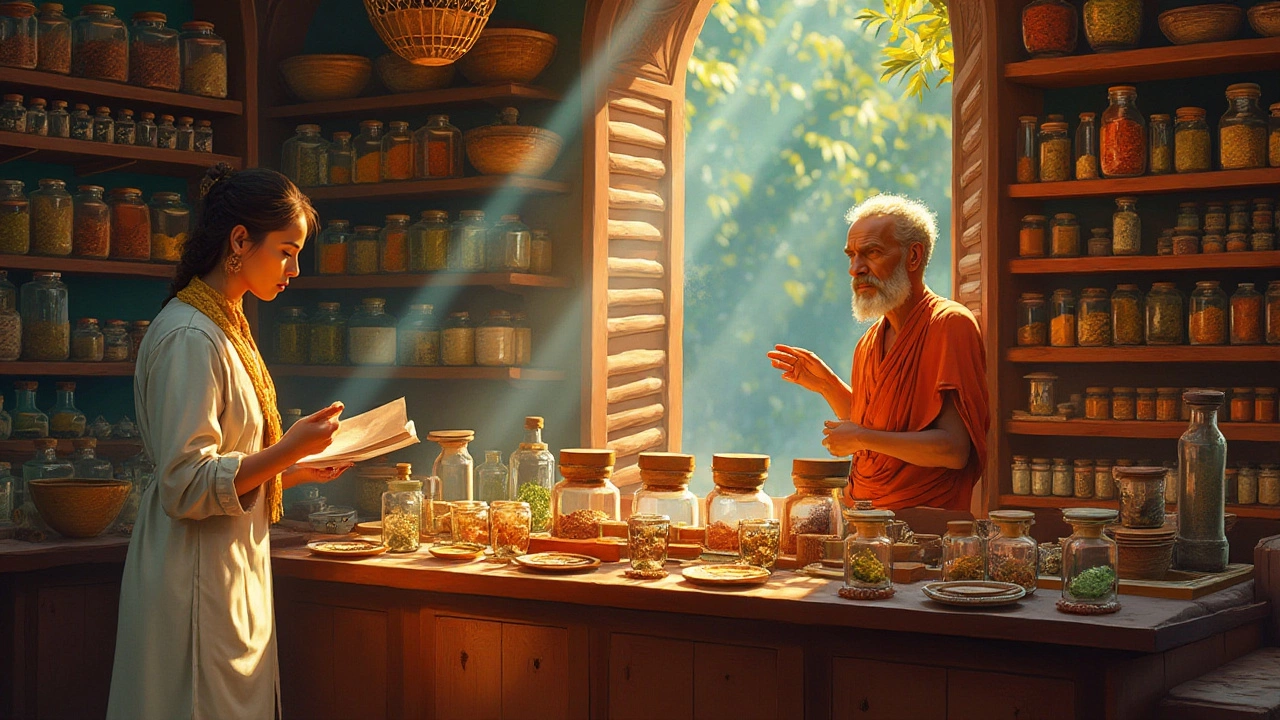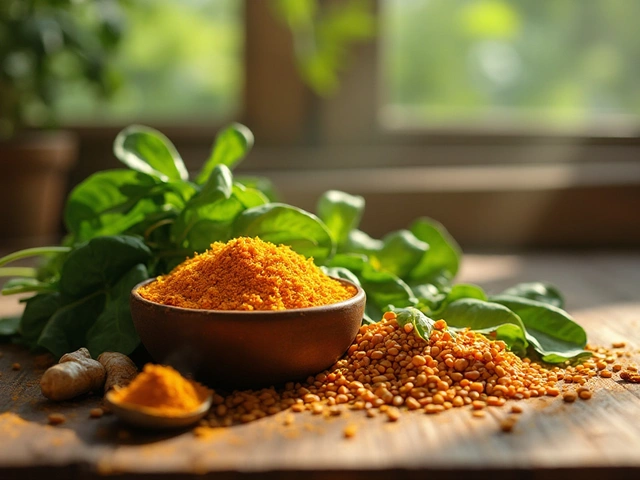
Walk into any supermarket or pharmacy, and you'll spot shelves loaded with herbal supplements promising more energy, sharper memory, or better immunity. Maybe your coworker swears by ginseng for focus, while your uncle pops turmeric pills like candy. But here's the real question: are these plant-based pills actually doing anything, or is it all wishful thinking?
People assume that herbs are safe just because they're 'natural'—but plenty of plants can have strong effects on the body (for better or worse). Some herbs, like echinacea, have become household names, while others linger in the shadows with barely any research to back up their claims. So before you reach for that next capsule or powder, it actually pays to know what you’re putting into your body and if it’s got any real-world proof to show it works.
- Herbal Supplements 101
- What the Science Really Says
- Popular Herbs: Hits or Misses
- Possible Risks and Side Effects
- Spotting Hype vs Evidence
- How to Pick a Safe Supplement
Herbal Supplements 101
Herbal supplements are basically concentrated forms of plants—think leaves, roots, seeds, or even flowers—packaged in a way that’s easy to swallow or mix into a drink. People buy these supplements hoping for benefits like better sleep, less stress, or improved digestion. Some of the most popular ones are ginseng, turmeric, echinacea, garlic, and St. John’s wort. You’ll find them as capsules, powders, teas, or even gummies. The main idea is that these plant extracts carry compounds that can affect your body’s chemistry.
Unlike prescription drugs, herbal supplements aren’t tightly regulated. In the U.S., for example, the FDA treats them more like food than medicine. That means companies don’t have to prove their products actually work or even list all ingredients as clearly as they should. Quality can bounce around—sometimes one bottle has twice the active stuff as another. Even brands that claim “natural” labels can have sneaky additives or fillers.
If you’re wondering why the hype, it comes down to belief in tradition and an urge to avoid pharmaceuticals. Lots of people trust ancient remedies passed down for centuries. A few herbs, like willow bark (which inspired aspirin), really do have a track record. But most herbal supplements on shelves haven’t gone through the same deep-dive testing as typical meds.
- Form matters: Different forms (teas, capsules, tinctures) can work in your body differently. For example, brewing chamomile as tea might feel gentle, while a concentrated extract could pack a stronger punch.
- Labels can mislead: Just because a supplement claims “pure” or “organic” doesn’t mean it’s effective or safe. Always check for third-party testing or certifications.
- Mixing matters: Some supplements clash with medicines you’re already taking. St. John’s wort, for example, messes with common antidepressants and even birth control.
At the end of the day, understanding what’s inside that little bottle can help you make choices that fit your needs—and maybe avoid wasting money on stuff that’s all talk and no results.
What the Science Really Says
People have been using plants as medicine for thousands of years, but just because something's been around forever doesn't always mean it works. Let's talk facts: studies on herbal supplements are all over the place. Some herbs really do something. For example, cranberry supplements can reduce how often women get urinary tract infections, according to a solid 2023 study from the Journal of the American Medical Association. St. John's Wort appears to help with mild depression in certain folks, but not for serious cases—and it can mess with other medications big time.
On the flip side, there's a lot of hype. Ginkgo biloba is everywhere for brain health, but a huge trial funded by the National Institutes of Health found that it didn't slow cognitive decline in older adults. Echinacea might shave off a day or two from a cold, but most research says it's not a miracle cure.
| Herbal Supplement | Main Use | What Studies Say |
|---|---|---|
| Cranberry | Prevent UTIs | May reduce frequency in women with recurrent UTIs |
| St. John's Wort | Depression | Helps mild depression, not for severe cases |
| Ginkgo | Memory/Focus | No real benefit in large clinical trials |
| Echinacea | Colds | May shorten duration, but not a cure |
| Turmeric | Inflammation | Early signs for joint pain, needs more research |
One problem with herbal supplement research is quality. The pill you buy might not have the same amount of active ingredient as the one used in studies. There’s also the placebo effect—a lot of folks feel better just because they expect to, not because the herb actually did something.
If you're thinking of trying an herbal supplement, check if there’s real research to back it up. Look for info from trusted health sources, not just the label or a popular Instagram account. And remember, just because it’s natural doesn’t always mean it’s totally safe or effective.
Popular Herbs: Hits or Misses
When people think about herbal supplements, a few big names pop up all the time. But do these top sellers live up to the hype, or are people just hoping for the best? Here’s what the science says about some go-to herbs.
- Turmeric (curcumin): If your knees wake you up more often than your alarm clock, you’ve probably heard about turmeric. It’s famous for fighting inflammation. A lot of studies say curcumin (the key part in turmeric) can help with joint pain. It’s not a miracle, but it may cut down swelling and aches when you take it regularly. Just know, curcumin doesn't absorb that well on its own. Black pepper can boost how much your body takes in, so some good supplements will include both.
- Echinacea: Every flu season, this one shows up in teas and capsules everywhere. People take it hoping to dodge colds. Some research hints that echinacea might slightly shorten how long you feel sick, but it's not a shield against catching a cold in the first place. And some studies show no difference at all. Basically, don’t put all your faith in this one during sniffle season.
- Ginseng: Lots of folks use ginseng to boost energy and focus, especially when they’re dragging at work. It’s studied mostly in Asia and seems to have a mild perk-up effect—not like coffee jitters, but a gentle nudge. If you’re expecting a burst, you’ll likely be let down. But for a small pick-me-up, it could help some people.
- St. John’s Wort: Talk about a controversial herb. It’s famous for easing mild depression, and there's some real research backing that up. But it doesn’t mix well with a bunch of common meds—from birth control to antidepressants. You have to be careful and always talk to a doctor before trying it.
- Garlic: People use garlic pills hoping to lower their blood pressure or cholesterol. The effect isn’t huge, but some people do see small improvements. Realistically, eating fresh garlic in your meals is better for you. Pills aren’t magic but can be an extra nudge.
Plenty of herbs just don’t have much evidence behind them. Loads of products stick “ancient formula” on the label, but with little else supporting them. Before shelling out, check if the claims are backed by solid studies or just clever marketing. And if you do try an herb, give it a fair shake—meaning, use it as directed and see how your body responds. Not every herb works for everyone, so some trial and error is part of the deal.

Possible Risks and Side Effects
Herbal supplements sound safe, especially compared to prescription meds, but they can cause real side effects and sometimes make things worse. For example, St. John’s Wort, a go-to for mood, can mess with how your body absorbs other medicines—including birth control pills. Ginkgo biloba, which lots of folks take for memory, can thin your blood and make you bruise or bleed easier, especially if you’re already taking blood thinners.
The problem is, most herbal supplements aren’t regulated like regular drugs. That means you can’t always be sure about the amount of active stuff in each pill or if there’s something weird mixed in. A 2023 lab analysis found almost one in five herbal supplements contained ingredients not listed on the label, which is honestly pretty dodgy.
- Mixing herbs with prescription meds can trigger nasty interactions.
- Some can cause allergic reactions—even if you’re not usually sensitive to plants.
- Pregnant and breastfeeding women should double-check everything—some herbs can cause trouble for babies.
- High doses rarely equal better results; sometimes, it just means extra side effects.
Check out this table for some of the most common side effects linked to popular herbal supplements:
| Herb | Common Side Effects | Risky Interactions |
|---|---|---|
| St. John’s Wort | Dry mouth, dizziness, stomach upset | Antidepressants, birth control, blood thinners |
| Ginkgo Biloba | Headache, nausea, bleeding | Blood thinners, aspirin |
| Echinacea | Allergic reaction, rash, upset stomach | Immunosuppressants |
| Turmeric | Diarrhea, nausea | Blood thinners, diabetes meds |
| Ginseng | Headache, trouble sleeping, increased heart rate | Diabetes drugs, blood thinners |
Bottom line: don’t assume herbal means harmless. If you’re on meds, pregnant, have allergies, or just want to be safe, talk to your doctor or pharmacist first. Simple step, but it can save you a world of hassle later on.
Spotting Hype vs Evidence
It's easy to get swept away by big promises on herbal supplements labels—"boosts immunity in days!" or "sharpens your mind instantly!" But if something sounds magical, you’ve got to ask: is there real proof, or just clever marketing?
Let’s break it down. The best evidence comes from studies that test people—the bigger and longer, the better. If a brand only mentions "used for centuries" without modern research, that barely tells you anything about actual results or safety. Always dig for proof from clinical trials and avoid products that just rely on stories or hype.
- Look for supplements with results published in peer-reviewed medical journals. These are way more reliable than testimonials or celebrity endorsements.
- If a study only tested ten people, don’t bet your health on it. Good studies need lots of participants and clear, repeatable results.
- Watch out for brands that hide behind terms like “proprietary blend” without saying exactly what’s inside.
- Statements like "may help" actually mean there’s not enough solid research to call it effective.
Here’s a quick comparison of hype vs real evidence for a few popular herbal supplements:
| Supplement | Usually Hyped As | Actual Clinical Evidence |
|---|---|---|
| Echinacea | Cures the common cold | Mixed results, some studies show minor benefit, many show no effect |
| St. John’s Wort | Natural antidepressant | Works for mild depression, but not major depression; can interact seriously with other meds |
| Ginkgo Biloba | Improves memory | Large studies found no benefit for dementia or cognitive decline |
| Turmeric/Curcumin | Reduces inflammation everywhere | Some small studies show a bit of help for joint pain, but more big research is needed |
If you want to check up on claims, the National Institutes of Health (NIH) has a free database on dietary supplements where you can see what real research says. When something isn’t backed up by strong trials, it’s best to treat those miracle claims as just good marketing.
How to Pick a Safe Supplement
Picking the right herbal supplement isn't as easy as grabbing the cheapest bottle or falling for a shiny new brand on TikTok. Loads of these products aren’t checked by the FDA the same way regular medicine is. So honestly, you’ve gotta do a bit of homework before buying anything that promises to "boost" your health.
Here’s what doctors and scientists recommend when hunting for a safe herbal supplement:
- Check for third-party testing. Look for seals from groups like USP (United States Pharmacopeia), NSF International, or ConsumerLab. These independent labs test the supplement to make sure what's on the label is actually in the bottle—and that it’s not loaded with junk or harmful stuff.
- Know your dosage. Packaged herbs can vary a ton in strength. Labels should list the amount of actual active ingredients. If they don’t, that’s a red flag.
- Skip wild claims. If a supplement promises to cure everything from arthritis to memory loss, take a step back. These miracle claims aren’t just fishy—they can be dangerous and are usually not backed up by legit studies.
- Check for interactions. Some herbs—like St. John’s wort—can mess with your regular medicines. If you’re on prescription drugs, even for stuff like allergies or blood pressure, talk to your doctor first.
- Watch the fine print. Make sure you spot the ingredient list. Cheap fillers or extra stuff like "proprietary blends" often mean you’re not getting what you think you’re buying.
- Research the brand. Google the company and check out where it’s made, how long they’ve been around, and if there are loads of complaints. Brands that’ve stuck around for years generally take quality more seriously.
Here’s a quick table to help you compare important things before buying:
| Factor | Why it Matters | What to Look For |
|---|---|---|
| Third-Party Seal | Shows an outside group checked purity & strength | USP, NSF, ConsumerLab seal |
| Label Dosage | Lets you know what (and how much) you’re taking | Clear dosage info for each herb |
| Brand Reputation | Avoids scam shady companies | Well-known, long-standing brands |
Doctor Pieter Cohen, a supplement safety expert at Harvard, put it simply:
"If it sounds too good to be true, it probably is. Herbal supplements aren’t cure-alls, and the safest way to use them is to treat them with caution and do your research."
Don’t just take marketing at face value. If a supplement is worth your money—and more importantly, your health—it shouldn’t be hard to figure out exactly what’s in it and who stands behind it.







